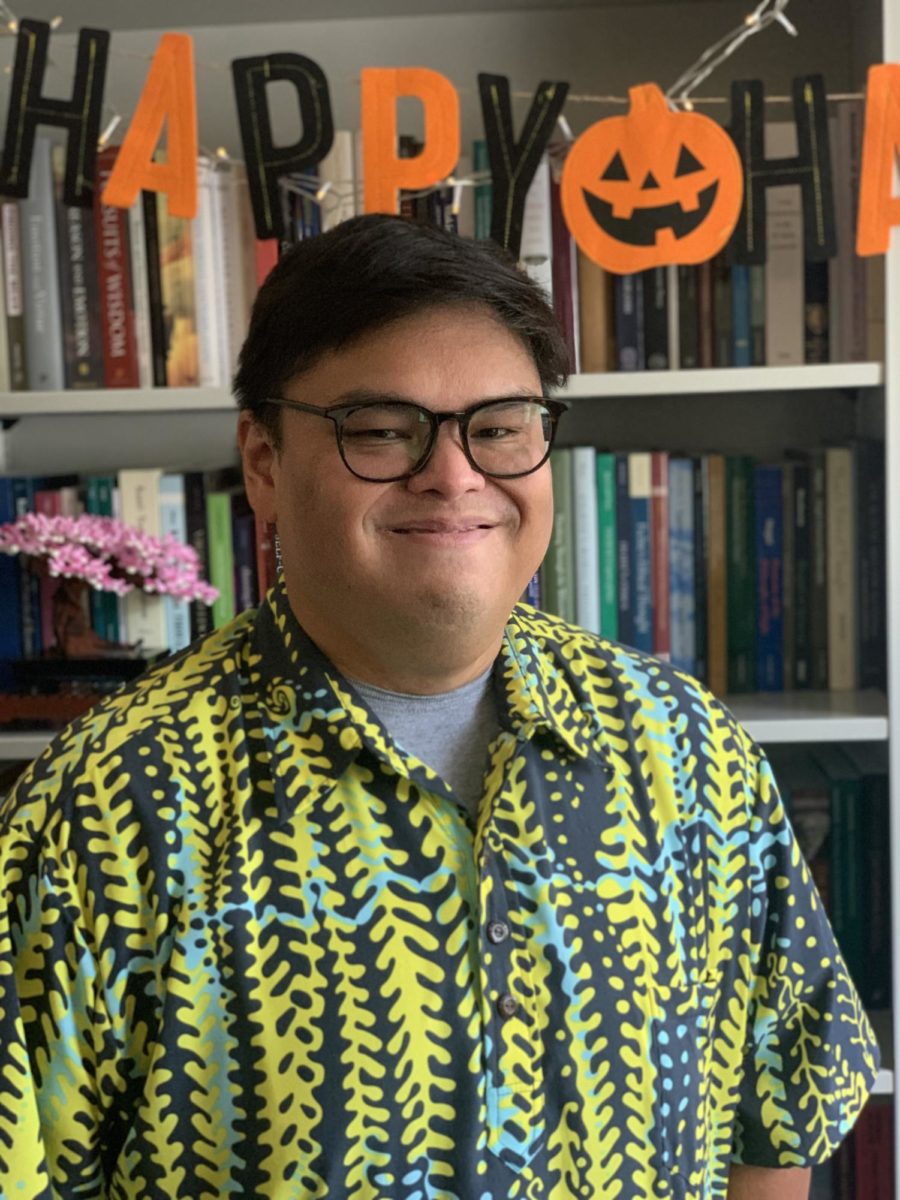Dustyn Ragasa, a religion professor and the director of the Master of Pastoral Theology Program, has been at Chaminade since 2019. While enjoying success here at Chaminade, life has not always been easy for the Kauaʻi native.
As the only child in a big family, Ragasa went through a number of tribulations. At the age of 13, Ragasa lost his grandfather with whom he was very close with. Growing up with a single mother, his grandfather was the male role model that he looked up to in his life. After his death, Ragasa went on a downward spiral, which eventually led him to drop out of school his sophomore year.
Two decades later, he’s now able to use those tough experiences to help him connect with his Chaminade students.
“When I see someone come through the door, the first thing that I have to remind myself is this person has a past,” said Ragasa, who is 36 years old. “They might be going through a really hard time, and the least I can do is sometimes the little things like talking story. My message to them is always the same. ‘I don’t know what you’re going through, but I have had a story and a life of my own. No matter what happens to you I want you to know that number one, it can be done. And number two I am willing to help you get through whatever you need.’”
Ragasa’s educational journey could have ended a long time ago. Once he dropped out the first time, because of the Hawaiʻi Compulsory Education Laws, Ragasa said he was considered a juvenile delinquent because he was not in school. He was in and out of court, and when he returned to school, he would have to get slips signed by teachers to show he went to class. These slips were referred to as “dog tags,” Ragasa said.
For him and others who received these slips, it was de-humanizing.
Ragasa dropped out again from Waimea High School for good as a sophomore after having enough of the system. To do so, he needed the approval of a psychiatrist to show that he wasn’t a danger to himself or others. As it turns out, the psychiatrist he went to see to get him out of school also encouraged him to attend college.
Dr. Marcie Black, Ragasa’s psychiatrist at the time, told him she believed he would thrive in college.
With Black’s encouragement, he earned his GED and was referred to Chaminade. He said that when he was accepted into chaminade, he knew what he wanted to do with his life.
“Here in Hawaiʻi, there are enough people who don’t fit into pre-made programs,” Ragasa said. “They’re not bad kids, they just didn’t have a good background. I realized at that moment I wanted to do things to help people like me out.”
After making it to Chaminade, Ragasa recalled a special moment between him and his mother when he broke the news to her that he was accepted.
“The only person who believed in me was my mom,” he said. “She was a person who was willing to let me make mistakes but also help me grow.”
He earned his undergraduate degree in Religious Studies from Chaminade in 2007 and went on to attend the University of Cal at Berkeley. He eventually got his master’s and doctorate in Ethics.
In his time as a professor here at Chaminade since 2019, Ragasa has taught many students through a number of classes. Although the classes are religion based, he carries a message for those in his class. The Chaminade professor notes that there’s a place at a Catholic university for everyone. A message he frequently passes down to his students is that he doesn’t expect them to believe in his religion, but he expects them to know and understand it.
Through his work here at Chaminade, Ragasa has made an impact on students and even fellow faculty members. Janet Davidson, the Vice Provost of Academic Affairs, noted that Ragasa is well prepared with his lessons and is a phenomenal professor overall. Davidson also shared that Ragasa is an intellectual individual and pushes other faculty to think deeper in their meetings.
“Dr. Ragasa does a very good job of raising the bar for everyone and lifting everyone up at the same time,” Davidson said. “He’s just remarkable and connects with all types of folks.”
